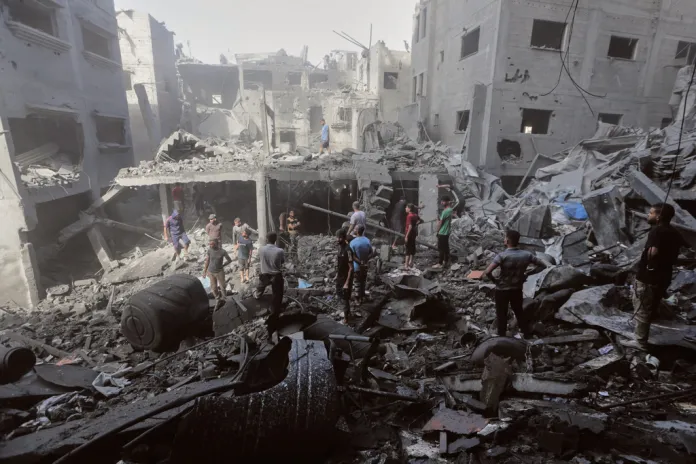A wave of Israeli airstrikes killed dozens of Palestinians in Gaza after Israeli Prime Minister Benjamin Netanyahu accused Hamas of breaking the ceasefire, the first big test of President Donald Trump’s peace deal.
Netanyahu said on Wednesday morning that the ceasefire is back on.
Israel has launched several targeted strikes in Gaza since the ceasefire began earlier this month, but Tuesday’s attacks were the largest. Israeli Defense Minister Israel Katz claimed that “dozens of Hamas commanders” were killed in the strikes, while the Gaza Ministry of Health, overseen by Hamas, reported over 100 people killed.

The death toll was exacerbated by a lack of medical supplies, which have trickled in at a quantity smaller than hoped for due to tensions over the ceasefire. Among those killed was a Palestinian journalist, Mohammed al Munirawi, and his wife, who were killed while sheltering in a tent. Also among the dead were 18 members of a single family, sources told Al Jazeera.
Israel said it conducted the strikes in response to a Hamas attack against Israel Defense Forces soldiers in Rafah, which resulted in one death. The killed soldier was identified as Sgt. Yona Feldbaum, 37, of the Gaza Division’s Combat Engineering Corps.
Hamas denied any involvement in the shooting death of Feldbaum. It said it would delay the return of a hostage’s remains in response to the ceasefire violation.
The IDF said the strikes were limited, and it would now return to upholding the ceasefire agreement.
“In accordance with the directive of the political echelon, and following a series of strikes, in which dozens of terror targets and terrorists were struck, the IDF has begun the renewed enforcement of the ceasefire in response to Hamas’s violations,” the IDF said in a statement.
It added that the strikes killed at least 30 Hamas and allied fighters holding command positions.
Speaking to reporters aboard Air Force One, Trump accepted the Israeli explanation.
“From what I understand, [Hamas] took out an Israeli soldier. I just heard about it a little while ago. They killed an Israeli soldier, so Israel hit back, and they should. When that happens, they have every right to respond,” Trump said.
He then dismissed the possibility that the strikes could jeopardize the wider peace deal.
“No, nothing’s going to jeopardize it,” he responded. “You have to understand, a loss like that is a very small part of peace in the Middle East, but they have to behave. They’re tough people, but they said they would act responsibly. If they behave, they’ll be happy. If not, they’ll be terminated, and they know that. We have many countries ready to stand with us on this.”
“It’s a strong coalition. Hamas is small, but they’re killers. They’ve grown up that way, and they don’t stop. From what I’m told, this was sniper fire, and Israel’s strike was retribution. They had a right to do that,” he added.
The Gaza Health Ministry has reported 211 Palestinian deaths and 597 injuries in Israeli attacks since the ceasefire began on Oct. 10.
Hamas and the Netanyahu government are walking a tightrope in implementing Trump’s peace deal, trying to balance their international images and domestic support. Rob Geist Pinfold, lecturer in international security at King’s College London, compared the adversaries’ behavior to a childhood game of chicken.
“So what we’re seeing is this game of chicken where both sides are trying to test each other’s limits, test each other’s boundaries, while also looking for the smoking gun that gives them the excuse to violate the ceasefire,” he told Al Jazeera.
“The fact that a soldier was killed in Rafah — we still don’t know by whom, we still don’t know if this was ordered by Hamas or this was somebody else or a Hamas cell operating independently — [allowed] Israel to seize this opportunity to violate the ceasefire because this is what they wanted all along,” Pinfold added.
NETANYAHU ORDERS ‘POWERFUL’ STRIKES IN GAZA IN MOVE THAT THREATENS CEASEFIRE
While Netanyahu’s strikes were denounced by many of his critics, he also faced heavy criticism from one of his allies. Israeli Minister of National Security Itamar Ben-Gvir accused him of weakness in failing to return to “full-scale war” and destroy Hamas.
“Hamas has again murdered one of our soldiers during the ‘ceasefire,’ and once again the Prime Minister chooses to end the event with the concept of a ‘measured response’ and an immediate return to the ceasefire, while continuing to allow ‘humanitarian’ aid into Gaza, instead of returning to full-scale war and striving to quickly achieve its main goal: the destruction of Hamas,” he said.
